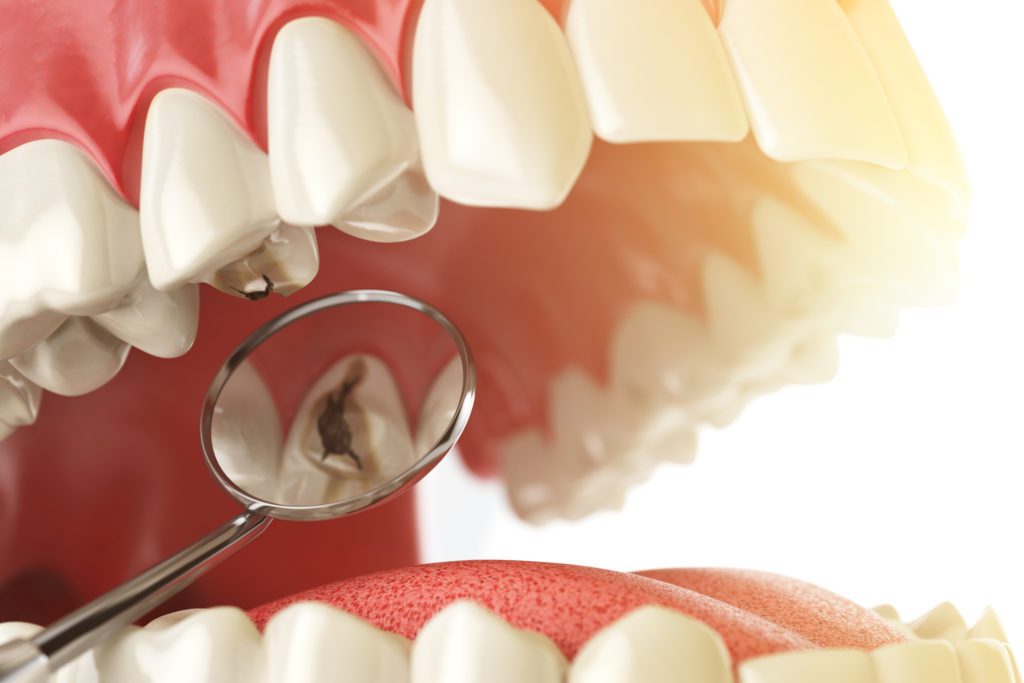Caring for your teeth and gums is an important part of caring for your physical health. Unhealthy teeth and gums can lead to other problems that can affect your body. Your teeth and gums require daily care that includes brushing and flossing. They also require professional care that includes bi-annual visits to your dentist. Failing to follow these basics can lead to tooth decay (also called dental caries or cavities).
Dr. Joseph Thompson is a caring general dentist in Greeley, CO that provides treatment for tooth decay. Decay is one of the most common dental concerns prevalent among children. However, adults also get cavities.

What is Tooth Decay?
Tooth decay is when the surface of the tooth begins to erode. The outer layer of the tooth, the enamel, will continue to erode until treatment is sought from a dentist. The damage this causes to the tooth is permanent.
During each routine dentist appointment, your dentist will look for signs of cavities. This includes spots on your teeth that are black, grey, or brown. Tooth decay can also cause a hole to form on your tooth and bad breath in some patients. Toothaches are common however many people with dental caries do not feel pain at all. Other symptoms include tooth sensitivity and sharp pain in the tooth.
What Causes Tooth Decay?
The main cause of tooth decay is too much sugar and starch in your diet combined with poor daily oral hygiene habits. When bacteria in your mouth combine with sugars and starches from the food you eat, it will make plaque. If the plaque sits on your teeth for too long, it will produce acid which slowly causes the enamel to erode from your teeth. If you brush your teeth twice a day, you will remove the plaque from your teeth and prevent tooth decay from damaging your teeth.
Treatment for Tooth Decay in Greeley, CO
Teeth Cleanings
We perform teeth cleanings at every routine dentist appointment. This procedure will remove plaque and bacteria that can hide your mouth. Places where your toothbrush and floss may not be able to reach. This in addition with proper brushing and flossing every single day is the best way to prevent tooth decay.
Dental Sealants
A dental sealant is a thin coating of plastic that your dentist will paint onto your back molars. We recommend them on children once those molars come in. They adhere to the surface of the tooth adding an extra layer of protection from decay. This is a common spot where children often get cavities.
Dental Fillings
A dental filling is a conservative treatment to stop tooth decay and fix the damage to the tooth. Your dentist will remove the decayed portion of the tooth and fill in the space with composite resin. This material will blend in perfectly with the rest of tooth. It will protect the tooth from further damage.
Restorative Dental Care
If you have avoided the dentist for many years, chances are you have a cavity that is severe. In this case, the dentist will recommend a restorative dental treatment. Which treatment you need will depend on the severity of the decay. If a good portion of the tooth is missing, a tooth filling will not work. You will need an inlay or an onlay. If the damage to the tooth is too big for that, then you may require a dental crown. Tooth decay that has been left untreated for years may require extraction.
If you suspect you have a dental cavity, let Dr. Thompson know at your next dentist appointment. He will recommend the right treatment for you and give you advice on how to prevent them. To book your next dentist appointment, contact our local Greeley, CO dentist office by calling 970.205.9614 or request an appointment with Dr. Thompson on our website.
